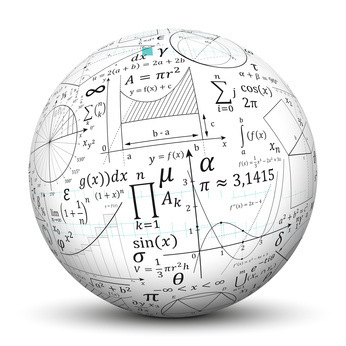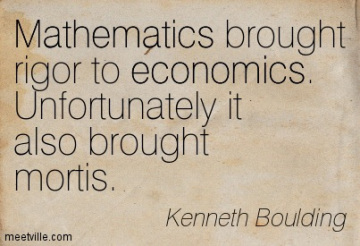Critical realism and mathematics in economics [embedded content] Interesting lecture, but I think just listening to what Tony Lawson or yours truly have to say, shows how unfounded and ridiculous is the idea that many mainstream economists have that because heterodox people often criticize the application of mathematics in mainstream economics, we are critical of math per se. [embedded content] Indeed. No, there is nothing wrong with mathematics per se. No, there is nothing wrong with applying mathematics to economics. Mathematics is one valuable tool among other valuable tools for understanding and explaining things in economics. What is, however, totally wrong, are the utterly simplistic beliefs that • “math is the only valid tool” • “math is always and everywhere self-evidently applicable” • “math is all that really counts” • “if it’s not in math, it’s not really economics” • “almost everything can be adequately understood and analyzed with math” When it comes to the issue of mathematics in economics Roger Farmer also has some good advice well worth considering: A common mistake amongst Ph.D. students is to place too much weight on the ability of mathematics to solve an economic problem. They take a model off the shelf and add a new twist.
Topics:
Lars Pålsson Syll considers the following as important: Economics
This could be interesting, too:
Lars Pålsson Syll writes Schuldenbremse bye bye
Lars Pålsson Syll writes What’s wrong with economics — a primer
Lars Pålsson Syll writes Krigskeynesianismens återkomst
Lars Pålsson Syll writes Finding Eigenvalues and Eigenvectors (student stuff)
Critical realism and mathematics in economics
Interesting lecture, but I think just listening to what Tony Lawson or yours truly have to say, shows how unfounded and ridiculous is the idea that many mainstream economists have that because heterodox people often criticize the application of mathematics in mainstream economics, we are critical of math per se.
Indeed.
No, there is nothing wrong with mathematics per se.
No, there is nothing wrong with applying mathematics to economics.
 Mathematics is one valuable tool among other valuable tools for understanding and explaining things in economics.
Mathematics is one valuable tool among other valuable tools for understanding and explaining things in economics.
What is, however, totally wrong, are the utterly simplistic beliefs that
• “math is the only valid tool”
• “math is always and everywhere self-evidently applicable”
• “math is all that really counts”
• “if it’s not in math, it’s not really economics”
• “almost everything can be adequately understood and analyzed with math”
When it comes to the issue of mathematics in economics Roger Farmer also has some good advice well worth considering:
A common mistake amongst Ph.D. students is to place too much weight on the ability of mathematics to solve an economic problem. They take a model off the shelf and add a new twist. A model that began as an elegant piece of machinery designed to illustrate a particular economic issue, goes through five or six amendments from one paper to the next. By the time it reaches the n’th iteration it looks like a dog designed by committee.
Mathematics doesn’t solve economic problems. Economists solve economic problems. My advice: never formalize a problem with mathematics until you have already figured out the probable answer. Then write a model that formalizes your intuition and beat the mathematics into submission. That last part is where the fun begins because the language of mathematics forces you to make your intuition clear. Sometimes it turns out to be right. Sometimes you will realize your initial guess was mistaken. Always, it is a learning process.
And — of course — the always eminently quotable Keynes did also have some thoughts on the use of mathematics in economics …
But I am unfamiliar with the methods involved and it may be that my impression that nothing emerges at the end which has not been introduced expressly or tacitly at the beginning is quite wrong … It seems to me essential in an article of this sort to put in the fullest and most explicit manner at the beginning the assumptions which are made and the methods by which the price indexes are derived; and then to state at the end what substantially novel conclusions has been arrived at …
I cannot persuade myself that this sort of treatment of economic theory has anything significant to contribute. I suspect it of being nothing better than a contraption proceeding from premises which are not stated with precision to conclusions which have no clear application … [This creates] a mass of symbolism which covers up all kinds of unstated special assumptions.
Letter from Keynes to Frisch 28 November 1935

